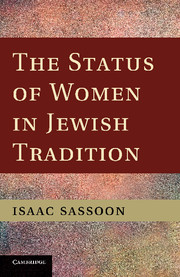Book contents
- Frontmatter
- Contents
- Preface
- Acknowledgements
- Glossary
- Abbreviations
- PART I MONOGAMY
- PART II COMMANDMENTS (MIṢVOT)
- PART III INTRINSIC EQUALITY
- 15 The Qaṭlanit Law
- 16 ‘Rankings’ of Horayot 3:7
- 17 Venus and Mars
- 18 Covenant
- 19 Gauging Purity's Weight in P
- 20 Body and Soul
- Conclusion
- Bibliography
- Index of Authors (Medieval & Pre-modern)
- Index of Citations from Rabbinic Literature
- Index of Names (Hebrew Bible)
- Index of Names (Talmudic)
- General Index
15 - The Qaṭlanit Law
Published online by Cambridge University Press: 01 June 2011
- Frontmatter
- Contents
- Preface
- Acknowledgements
- Glossary
- Abbreviations
- PART I MONOGAMY
- PART II COMMANDMENTS (MIṢVOT)
- PART III INTRINSIC EQUALITY
- 15 The Qaṭlanit Law
- 16 ‘Rankings’ of Horayot 3:7
- 17 Venus and Mars
- 18 Covenant
- 19 Gauging Purity's Weight in P
- 20 Body and Soul
- Conclusion
- Bibliography
- Index of Authors (Medieval & Pre-modern)
- Index of Citations from Rabbinic Literature
- Index of Names (Hebrew Bible)
- Index of Names (Talmudic)
- General Index
Summary
It was taught in a baraita: If a woman was married to one [husband] and he died, to a second and he died, she shall not be married to a third. These are the words of Ribbi. R. Simeon son of Gam[a]liel says to a third [husband] she shall be married, to a fourth she shall not be married. … What is the reason? R. Mordecai said to R. Ashi: thus said Abimi of Hagronia in the name of R. Hunna ‘ma‘yan (=the fount) is the cause’. But R. Ashi said ‘mazzal (= fate) is the cause’ (Yev. 64b)
Conspicuous by his absence is the husband who loses successive wives. What is the significance of this lacuna? Earlier we noted how the incest laws of Leviticus chapter 18 are formulated in the second person masculine. It is the brother who is told to desist from relations with his sister, but the sister is not directly addressed. Relations with his mother are forbidden a son, but the mother herself receives no parallel directive. Yet not for a moment do the rabbis exculpate the female accomplice in such incestuous crimes. The Mishnah carries on the same androcentric convention of formulating conjugal laws in the masculine which, unless indicated to the contrary, are understood to apply bilaterally.
Howbeit, the above explanation is seen by many as barking up the wrong tree. They argue that women are deliberately isolated for this qaṭlanit law because the belief undergirding it is inapplicable to coextensively bereaved husbands.
- Type
- Chapter
- Information
- The Status of Women in Jewish Tradition , pp. 124 - 126Publisher: Cambridge University PressPrint publication year: 2011



